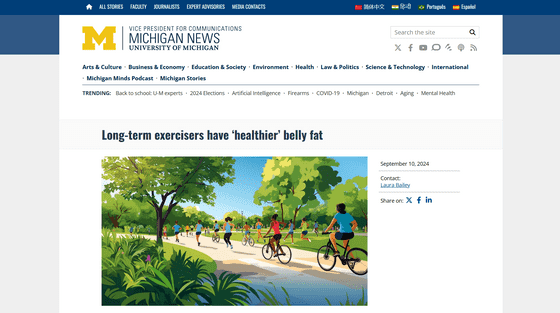Research shows that exercising regularly can help you lose weight, but it's a mistake to think that exercise is pointless if you don't lose weight.

Fat is not the same everywhere, and people with 'visceral obesity,' where fat accumulates around the stomach and intestines,
Years of endurance exercise training remodel abdominal subcutaneous adipose tissue in adults with overweight or obesity | Nature Metabolism
https://www.nature.com/articles/s42255-024-01103-x
Long-term exercisers have 'healthier' belly fat | University of Michigan News
https://news.umich.edu/long-term-exercisers-have-healthier-belly-fat/

In a study published in Nature Metabolism on September 10, 2024, a research team led by Professor Jeffrey Horowitz, an exercise scientist at the University of Michigan in the United States, recruited 16 obese adults who had been exercising at least four times a week for at least two years, an average of 11 years, and took samples from their subcutaneous abdominal fat.
The research team also recruited 16 people who did not exercise but had the same gender, weight, and body fat content as the exercisers, and took similar samples from these people.
In a study of samples from 32 obese people, the researchers found that the fat tissue of those who exercised had more blood vessels, mitochondria, and health-beneficial proteins, but less metabolism-inhibiting collagen and inflammatory cells, whereas the fat tissue of sedentary people did not show these characteristics.
'Exercise has benefits beyond just burning calories,' Horowitz said. 'Many people gain weight as they age, but our research shows that if you gain weight, regular exercise over a period of months to years can actually transform adipose tissue and help you store body fat in a healthier way.'

One of the key points of this study is that the samples were taken from fatty tissue just under the skin of the abdomen.
Gaining subcutaneous fat may sound like a negative thing, but if you can build up subcutaneous fat efficiently through exercise, it can reduce the chances of fat accumulating in areas where it can have a major negative impact on your health, such as around your internal organs or the internal organs themselves.
Horowitz and his colleagues previously conducted
'This means that if you gain weight, the excess fat will be stored in a 'healthier' way under the skin, rather than in organs like the liver or heart, or in the fatty tissue surrounding those organs,' according to a University of Michigan press release.

In the United States, non-alcoholic fatty liver disease ( also known as fatty liver), which is caused by the accumulation of unhealthy fat in the internal organs and is associated with lack of exercise and dyslipidemia, is a particular problem. This is because excess fat accumulated in the liver in this way increases the risk of developing cirrhosis and cancer.
The research team plans to further investigate whether adipose tissue functions differently in exercisers and sedentaries, and what effect this has on the health of those who provided the samples.
Related Posts:
in Science, Posted by log1l_ks







